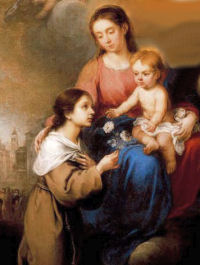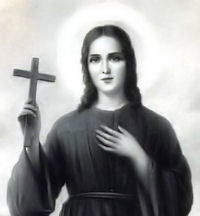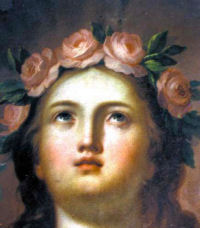Daily Readings for: September 04, 2012
(Readings on USCCB website)
Collect: God of might, giver of every good gift, put into our hearts the love of your name, so that, by deepening our sense of reverence, and, by your watchful care, keep safe what you have nurtured. Through our Lord Jesus Christ, your Son, who lives and reigns with you in the unity of the Holy Spirit, one God, for ever and ever.
RECIPES
ACTIVITIES
PRAYERS
LIBRARY
Ordinary Time: September 4th
Tuesday of the Twenty-Second Week of Ordinary Time
Old Calendar: Saint Rosalia, virgin (Hist); St. Rose of Viterbo, virgin (Hist)
Saint Rosalia, born in 1130 at Palermo in Sicily, was the daughter of a noble family descended from Charlemagne. While still very young she despised worldly vanities. When her remarkable beauty caused her to be sought in marriage by several lords of Sicily, the Blessed Virgin appeared to her and advised her to leave the world. She obeyed, taking with her only a crucifix and her instruments of penance; and guided by Angels, she made her first dwelling in a nearby grotto, which the snows of winter concealed. Then, when she began to be the object of searches instigated all over Sicily by her desolate family, she was advised by Angels to move to a low cave on Mount Pellegrino, three miles from Palermo. There, during sixteen years’ time, she completed the sacrifice of her heart to God by austere penance and manual labor, sanctified by assiduous prayer and the constant union of her soul with God. She died in 1160. — Little Pictorial Lives of the Saints
St. Rosalia's feast is included in the Roman Martyrology.
Historically it is also the feast of St. Rose of Viterbo, a member of the Third Order of St. Francis.
St. Rosalia
 St. Rosalia is the patroness of Palermo, and the citizens of that place annually celebrate two feasts in her honour. One of these was raised to the rank of a holy day of obligation by Pius XI in 1927. It is celebrated by a procession of unequalled magnificence, heralded by cannon fire. The saint's shrine, atop a gigantic carriage filled with musicians, is drawn through the town by forty mules, accompanied by prayers, hymns, and acclamations. The top of the carriage is level with the roofs of the houses; fireworks are set off everywhere; the musicians blow ceaselessly on their trumpets; and for the five days during which this celebration lasts, enthusiasm mounts to an increasingly high pitch.
St. Rosalia is the patroness of Palermo, and the citizens of that place annually celebrate two feasts in her honour. One of these was raised to the rank of a holy day of obligation by Pius XI in 1927. It is celebrated by a procession of unequalled magnificence, heralded by cannon fire. The saint's shrine, atop a gigantic carriage filled with musicians, is drawn through the town by forty mules, accompanied by prayers, hymns, and acclamations. The top of the carriage is level with the roofs of the houses; fireworks are set off everywhere; the musicians blow ceaselessly on their trumpets; and for the five days during which this celebration lasts, enthusiasm mounts to an increasingly high pitch.
The saint of Palermo thus honoured, seems to have delivered her country from the plague in 1625 and, since then, to have brought about innumerable cures. Her legend states that she was born around 1130 at the court of Roger II, king of Sicily, of a father called Sinibald, who was descended from Charlemagne. As her beauty constituted a danger to her soul, the Virgin appeared to her to urge her to leave the world. Rosalia was just fourteen. She took her crucifix, her discipline, and a few books and left her father's castle by night. Two angels, one armed like a knight, the other disguised as a pilgrim, were waiting to escort her to the summit of Mount Quisquita. There they left her at the entrance of a grotto hidden among the trees, buried under the snow. The young girl remained hidden there several months, after which the angels came to warn her that she was sought by her parents and had better flee elsewhere. They led her to the top of Mount Pellegrino. There, it is said, Rosalia, devoting herself to penances and miraculously nourished by the Host, passed the last sixteen years of her life. She died at the age of thirty; her body, long sought in vain, was found in the 17th century encased in a sheath of rock crystal; and it is the recovery of this relic which is commemorated by the procession mentioned above.
— Excerpted from Lives of the Saints, Omer Englebert
Patron: Isola delle Femine; Palermo; Sicily.
Symbols: A young girl with a wreath of roses; receiving the wreath from the Blessed Virgin and Christ Child as angels bring roses and with a skull near her; with a distaff, book, and palm; holding a double Greek cross, distaff and book or palm; or writing her name on the wall of the cave.
Things to Do:
- Visit this website to read more about the Feast of St. Rosalia.
St. Rose of Viterbo
 Saint Rose was born in the spring of 1235 at Viterbo, capital of the patrimony of Saint Peter. In those days the emperor Frederick II was oppressing the Church, and many were faithless to the Holy See. But this infant at once seemed filled with grace; she never cried; with tottering steps she sought Jesus in His tabernacle; she knelt before sacred images and listened to sermons and pious conversation, retaining all she heard, and this when she was scarcely three years old. One coarse habit covered her flesh; fasts and disciplines were her delight.
Saint Rose was born in the spring of 1235 at Viterbo, capital of the patrimony of Saint Peter. In those days the emperor Frederick II was oppressing the Church, and many were faithless to the Holy See. But this infant at once seemed filled with grace; she never cried; with tottering steps she sought Jesus in His tabernacle; she knelt before sacred images and listened to sermons and pious conversation, retaining all she heard, and this when she was scarcely three years old. One coarse habit covered her flesh; fasts and disciplines were her delight.
At the age of seven she wished to enter a monastery of nuns; but God had other designs for her, and she resolved to create a solitude in her father’s house, where she would forever spend all her days. Her mortifications there seem incredible to our time of laxity; she gave herself the discipline three times a day until she fainted from fatigue and loss of blood, and she scarcely ate at all. To those who urged her to mitigate her austerities, she explained so perfectly that happiness consists in suffering for God, that no one could doubt this was so for her.
Nonetheless she fell ill and nearly died of consumption. She was close to the final agony when suddenly she beheld the Mother of God, and said to those attending her: “All of you here, why do you not greet the Queen of the world? Do you not see Mary, the August Mother of my God, coming forward? Let us go to meet Her, and prostrate ourselves before Her majesty!” Everyone turned toward the door and knelt down, and the Mother of God spoke to Rose, telling her she must enter the Third Order of Saint Francis, then go out to “reprove, convince, exhort and bring back the erring to the paths of salvation. If your endeavors bring upon you sarcasm and mockery, persecution and labor, you must bear them patiently... Those who assist you will be enriched with all the graces of the Lord.”
To defend the Church’s rights was already Rose’s burning wish. When hardly ten years old, she arose after her reception into the Franciscan habit, went down to the public square at Viterbo, called upon the inhabitants to be faithful to the Sovereign Pontiff, and vehemently denounced all his opponents. She returned to her house only to redouble her flagellations and macerations; she saw her Saviour on the Cross and nothing could arrest her ardor thereafter. So great was the power of her word and of the miracles which accompanied it, that at the end of several months the Imperial party, after threatening her in vain to stop her preaching, in fear and anger drove her from the city.
Saint Rose and her parents moved to Soriano, a fortified city, where she continued to do as she had been told by the Mother of God. Then Rose went on by herself to Vitorchiano, where she had understood there was need for her, and continued to win souls by her aspect as much as by her words. She went barefoot and wore a poor tunic at all times, until after some eighteen months, when the emperor had died, she and her parents returned to Viterbo. Innocent IV was brought back in triumph to Rome and the cause of God was won.
A number of young girls came to her for instruction at Viterbo, and she taught them the principles of modest prudence and faithful love of God. Rose fell ill again and recognized that her end was approaching; she prepared, rejoicing, in solitude for her glorious destiny, and died in her eighteenth year. Not long afterward, she appeared in glory to Alexander IV, and bade him to translate her intact body. He found it fragrant and beautiful, as if still in life. For more than 700 years it has remained supple and unchanged, save for its color, darkened after a fire in the chapel where it reposed.
Excerpted from Les Petits Bollandistes: Vies des Saints, by Msgr. Paul Guérin (Bloud et Barral: Paris, 1882), Vol. 10; Little Pictorial Lives of the Saints, a compilation based on Butler’s Lives of the Saints and other sources by John Gilmary Shea (Benziger Brothers: New York, 1894)

 St. Rosalia is the patroness of Palermo, and the citizens of that place annually celebrate two feasts in her honour. One of these was raised to the rank of a holy day of obligation by Pius XI in 1927. It is celebrated by a procession of unequalled magnificence, heralded by cannon fire. The saint's shrine, atop a gigantic carriage filled with musicians, is drawn through the town by forty mules, accompanied by prayers, hymns, and acclamations. The top of the carriage is level with the roofs of the houses; fireworks are set off everywhere; the musicians blow ceaselessly on their trumpets; and for the five days during which this celebration lasts, enthusiasm mounts to an increasingly high pitch.
St. Rosalia is the patroness of Palermo, and the citizens of that place annually celebrate two feasts in her honour. One of these was raised to the rank of a holy day of obligation by Pius XI in 1927. It is celebrated by a procession of unequalled magnificence, heralded by cannon fire. The saint's shrine, atop a gigantic carriage filled with musicians, is drawn through the town by forty mules, accompanied by prayers, hymns, and acclamations. The top of the carriage is level with the roofs of the houses; fireworks are set off everywhere; the musicians blow ceaselessly on their trumpets; and for the five days during which this celebration lasts, enthusiasm mounts to an increasingly high pitch.  Saint Rose was born in the spring of 1235 at Viterbo, capital of the patrimony of Saint Peter. In those days the emperor Frederick II was oppressing the Church, and many were faithless to the Holy See. But this infant at once seemed filled with grace; she never cried; with tottering steps she sought Jesus in His tabernacle; she knelt before sacred images and listened to sermons and pious conversation, retaining all she heard, and this when she was scarcely three years old. One coarse habit covered her flesh; fasts and disciplines were her delight.
Saint Rose was born in the spring of 1235 at Viterbo, capital of the patrimony of Saint Peter. In those days the emperor Frederick II was oppressing the Church, and many were faithless to the Holy See. But this infant at once seemed filled with grace; she never cried; with tottering steps she sought Jesus in His tabernacle; she knelt before sacred images and listened to sermons and pious conversation, retaining all she heard, and this when she was scarcely three years old. One coarse habit covered her flesh; fasts and disciplines were her delight.